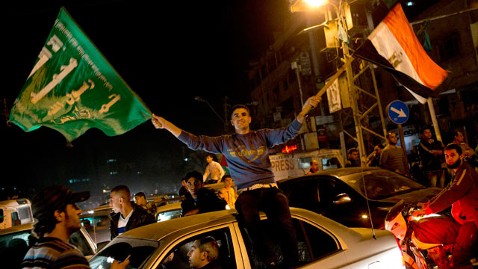White House Officials Say Israel-Hamas Cease-Fire is 'Tenuous'

Bernat Armangue/AP Photo
The Israel-Hamas cease-fire brokered by the Obama administration, Israeli Prime Minister Benjamin Netanyahu and Egyptian president Mohammed Morsi, and announced today is fragile, White House officials acknowledged.
"The way we view this is that it's an important step," a senior White House official said, "but our concerns are Egypt can't control all of Hamas," the ruling party in Gaza designated a terrorist group by the U.S. State Department, "and Hamas doesn't control every extremist with a rocket in Gaza. So there is a tenuous nature to this."
But for now, senior White House officials say that from their perspective, three phone calls with Egyptian President Morsi seemed significant.
The president spoke to Netanyahu every day since the crisis began, but his first significant call with Morsi was on Monday, November 19 in Phnom Penh, Cambodia.
President Obama left a dinner for the Association of Southeast Asian Nations a tad early to phone Morsi, aides said. They discussed ways to "de-escalate" the violence in Gaza and Israel, with President Obama underscoring "the necessity of Hamas ending rocket fire into Israel," aides said. The president offered his condolences for the loss of life in Gaza, as well as for the Saturday incident when a train collided with a school bus, killing more than 50 people most of them children.
He then spoke with Netanyahu, receiving an update on the situation, and expressing regret for the loss of Israeli lives.
The president then told his team that if Morsi called back to talk, they should wake him up. Morsi did so, at 2:30 a.m. Cambodia time. The president and Morsi spoke again.
Another senior White House official declined to get into the substance of the calls, but said the president was reviewing ideas with Morsi and Netanyahu, so it would be natural for him to follow up with Morsi after speaking to Netanyahu. The president told Morsi he intended to send Secretary of State Hillary Clinton to the region.
The next day, Tuesday, President Obama announced that Clinton would head to Egypt and Israel to try to broker a cease-fire. The president and Clinton, the second senior White House official said, talked about the Gaza-Israel fighting throughout the Asia trip.
The president today phoned both Morsi and Netanyahu "to seal the deal," the first senior White House official said.
The president, this official said, was struck by the fact that Morsi "was being pragmatic. He wanted to get to yes."
ABC News' Reena Ninan asked Ben Rhodes, deputy National Security adviser for strategic communication, if Morsi was a better broker for peace than his predecessor, Hosni Mubarak.
"Egypt has been a critical part of our effort to manage that conflict and pursue peace," Rhodes said. "That was the case under President Mubarak and it continues to be the case under President Morsi, who has upheld the peace treaty with Israel. What we've seen is, again, our engagement has been focused on practical and constructive cooperation that can reduce tensions but ultimately, again, it's going to have to be Hamas within Gaza that takes the step of, again, not pursing rocket fire into Israeli territory. But we agree that Egypt can and should be a partner in seeking to bring about that outcome."
Another interesting development, the White House official said, is that Hamas in this instance was looking to Egypt for leadership and not Iran, even though the latter country has been extremely supportive of Hamas.
-Jake Tapper